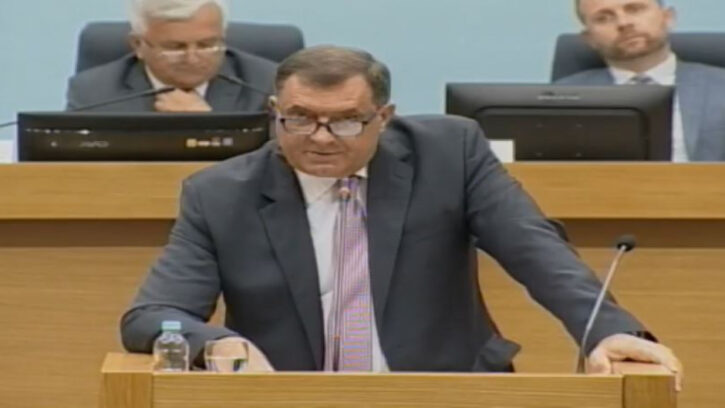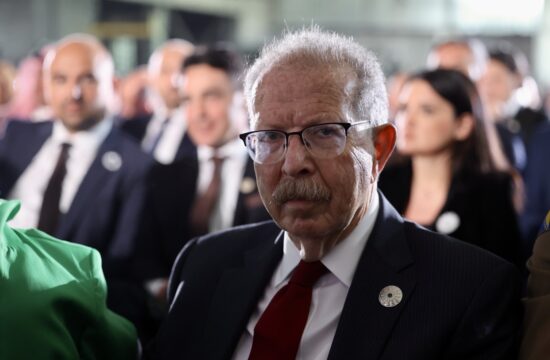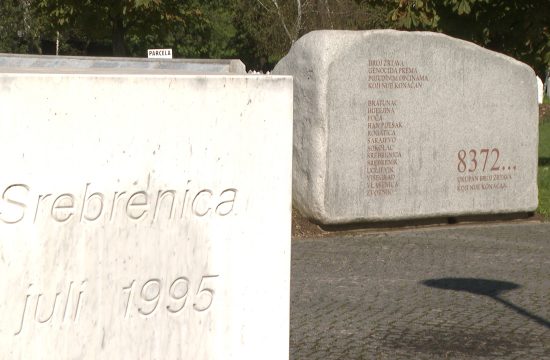
The international community is biased against Serbs and very selective when determining the truth regarding the 1992-1995 war in Bosnia, the President of the country’s Serb-dominated part, Republika Srpska (RS), said as he urged his Parliament to annul a 2004 report on the crimes committed in Srebrenica in July 1995.
Bosnian Serb forces systematically executed more than 8,000 Muslim Bosniaks after they overran the eastern Bosnian town in July 1995 and although experts, commissioned by the RS Government, confirmed the killings and the RS Parliament adopted their report in 2004, RS President Milorad Dodik seeks to annul it.
“At the time when historic decisions were made, there was also ill-intended pressure coming from various sides. The interest of the people of RS needs to be the top priority. Sometimes, the back of the people cannot withstand the injustice that time brings,” he said.
“I don’t want this historic injustice, which is wrapped in secrecy, to strike down on our people,” he added.
He said the Office of the High Representative, Bosnia’s top official overseeing the implementation of the 1995 Dayton Peace Agreement, has been given “unlimited and illegal power” with an aim to “brand the RS as a genocidal creation with the goal of eliminating it.”
“There is no justice when the Hague Court (The International Criminal Tribunal for the Former Yugoslavia) is issuing judgements, and even less of it when the Court of Bosnia and Herzegovina is doing so. The thesis about the genocide of Bosniak Muslims came about at the beginning of the conflict, and there are numerous documents speaking about this,” he said.
According to the Bosnian Serb leader, the 1995 Srebrenica massacre which two international courts determined was a genocide is an “agreed-on tragedy that had the goal of satanising Serbs.”
“We are witnesses to the fact that that, under the influence of the international community, the truth is selective. This is exactly the biggest reason for our opposition to the work of the Commission that put together the report,” he said, adding that “the Serb victims and the character of the plight of Serbs is not included” in the report.
“The total number of Serbs who were killed in the Podrinje region is 2,600, including 266 women and children,” he said, adding that the RS Government in place at the time did not put that in the report, which he said was created under an order of ex High Representative Paddy Ashdown, whom he called a “criminal.”
Dodik called for a document listing Paddy Ashdown’s alleged crimes against Serbs to be made.
The victims of the days-long Srebrenica killings were dumped in mass graves around the town. They are being excavated by forensic experts for years and identified through DNA analysis before they are reburied at a memorial centre near Srebrenica.
“A large number of those who were buried died in battle, and there are even living people on that list. I have that list,” he said, adding he will name some examples at a later time.
“As President, I have the obligation to stand in defence of every RS citizen,” he said. “We will not be harassed by someone’s pathological reasons and hatred.”
He called on Bosniaks to take part in another investigation that would result in a joint conclusion on what happened in Srebrenica but also establish that Serbs were killed in Sarajevo.
The country's Parliament ordered a commission to establish how many Serbs were killed in Sarajevo and under which circumstances but such a commission was never formed.
“A Commission that would look into the killings of Serbs in Sarajevo has never been formed, and the House of Peoples had made it an obligation,” he said, adding that those in power in Bosnia’s other semi-autonomous entity, shared by Bosniaks and Croats, the Federation (FBiH), did not want to do that.
“They did everything they could so it doesn’t come to that,” he said.
Doing all of this would contribute to reconciliation in Bosnia, Dodik said.
The former Prime Minister of the RS, Dragan Mikarevic, also took the stand, saying that in 2004 the RS Government could not reject to adopt the report because “of the evidence about the violations of the norms of the international … law committed by some of our people.”
“These were painful and difficult decisions that the Government had to make,” in order to keep its international credibility, Mikerevic said.
He added that he does not know of any RS Government that did not work under pressure, and that he himself endured direct and indirect pressure from the international community.
He also explained that at the time, the preparations for the 10th anniversary of the events in Srebrenica were under way and that international institutions pressed for evidence that Republika Srpska was cooperating with the UN tribunal.
“One has to consider that the political framework and the global, regional and local political forces were completely different than today,” Mikerevic said.



